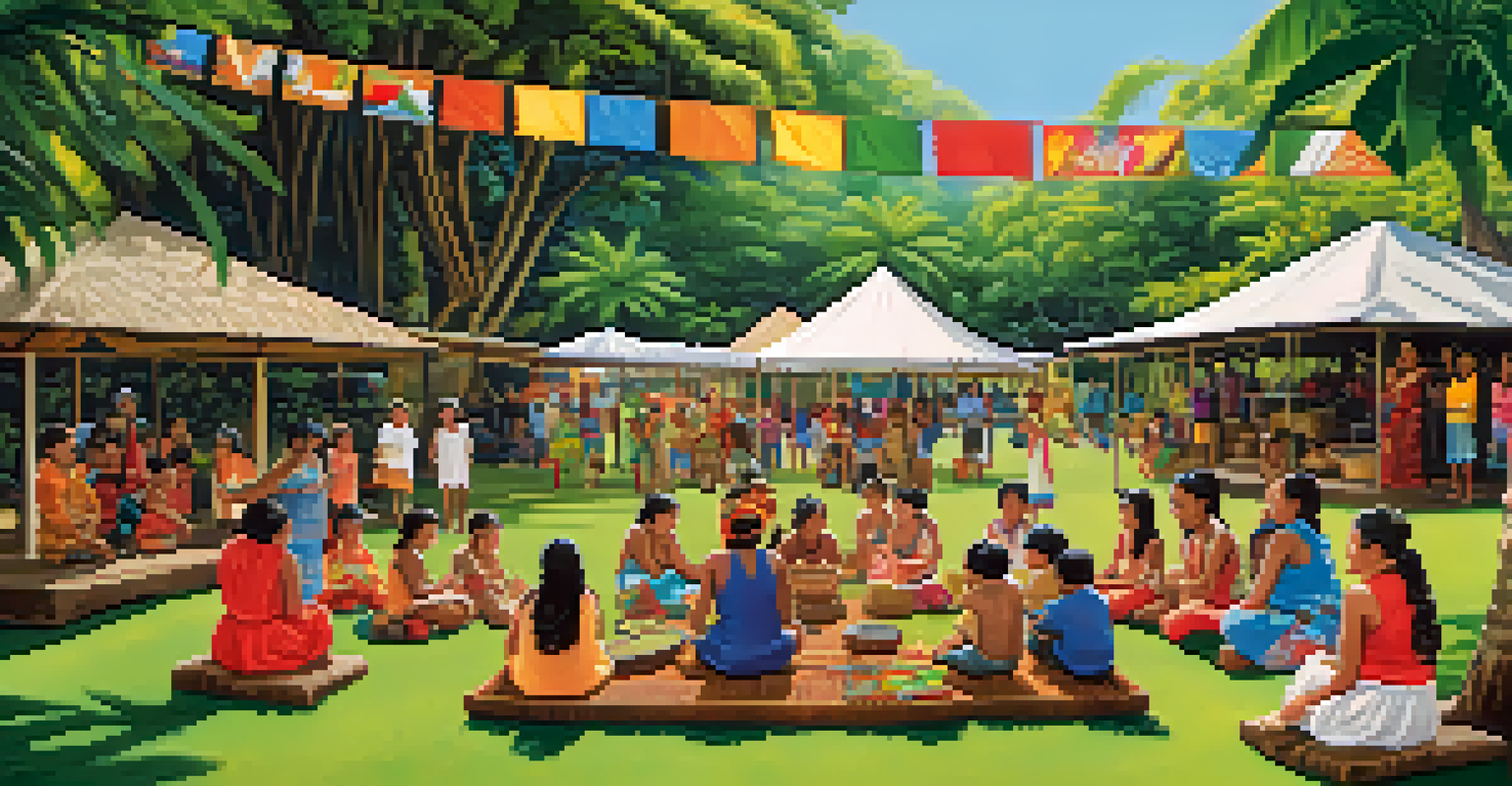Cultural Identity and Its Importance in Hawaiian Activism

Understanding Cultural Identity in Hawaii
Cultural identity in Hawaii is deeply rooted in the islands' history, traditions, and languages. It encompasses the unique practices of Native Hawaiians, their connection to the land, and their rich oral traditions. This identity shapes how individuals see themselves and their place within the broader Hawaiian community, creating a sense of belonging that is essential for activism.
In Hawaii, we believe that we are all connected to each other and the land. Our cultural identity is what binds us together in our fight for justice and preservation.
In Hawaii, cultural identity is not just a personal aspect; it's a collective experience that binds communities together. The values of 'Ohana (family) and Aloha (love) are integral in fostering unity and resilience among the people. This shared identity often becomes the driving force behind grassroots movements that seek to protect and preserve Hawaiian culture and heritage.
Through cultural identity, activists can articulate their concerns and aspirations, making their voices heard in a sea of global challenges. It serves as a powerful tool in addressing issues like land rights, environmental protection, and cultural preservation, reminding us that activism is rooted in community and identity.
Historical Context of Hawaiian Activism
Hawaiian activism has a rich history that dates back to the overthrow of the Hawaiian monarchy in 1893, a pivotal moment that sparked a wave of resistance. This event awakened a collective consciousness among Native Hawaiians, igniting a desire to reclaim their rights and identity. Understanding this context is crucial to grasping the current landscape of activism in Hawaii.

The cultural identity of the Hawaiian people has been shaped by historical injustices, including the loss of land and language. These experiences have fueled movements like the sovereignty movement, which seeks to restore rights and recognition to Native Hawaiians. By embracing their cultural identity, activists can draw strength from their ancestors' struggles, turning pain into a passionate call for action.
Cultural Identity Fuels Activism
In Hawaii, cultural identity is a powerful catalyst for activism, uniting communities around shared values and collective experiences.
Today, many Hawaiian activists reference this historical narrative, weaving it into their campaigns for social justice and environmental stewardship. They remind us that the fight for cultural identity is ongoing, and each generation plays a vital role in this legacy.
The Role of Language in Cultural Identity
Language is a cornerstone of cultural identity, and in Hawaii, the revival of the Hawaiian language has been a significant aspect of activism. Efforts to teach and incorporate ʻŌlelo Hawaiʻi (the Hawaiian language) in schools and communities have surged, helping to preserve this vital aspect of cultural identity. Language carries stories, values, and traditions that are essential for understanding one's heritage.
Language is the foundation of cultural identity. When we speak our native tongue, we are not just communicating; we are reviving our history and our ancestors’ dreams.
When individuals engage with their native language, it fosters a deeper connection to their culture and community. This connection is evident in activist movements that utilize Hawaiian language in their messaging and campaigns, reinforcing cultural pride and solidarity. Language becomes a rallying cry, uniting people in a shared purpose.
Moreover, the revitalization of the Hawaiian language symbolizes resistance against colonial influences that sought to erase it. By reclaiming their language, activists assert their cultural identity, challenging dominant narratives and emphasizing the importance of indigenous voices in contemporary discussions.
Cultural Practices as Tools for Activism
Cultural practices, such as hula, chant, and traditional crafts, play a significant role in Hawaiian activism. They serve as living expressions of identity, connecting individuals to their ancestors and the land. Activists often use these practices in demonstrations and public events to draw attention to their causes and educate others about Hawaiian culture.
By incorporating cultural practices into activism, participants can create a space for dialogue and understanding. For instance, showcasing hula as a form of storytelling allows activists to share their history and values with a wider audience. This artistic expression can evoke empathy and inspire action, bridging cultural gaps.
Language Revitalization Matters
The revival of the Hawaiian language underscores its vital role in preserving cultural identity and empowering activism.
Furthermore, these practices help to reinforce community bonds, as they often involve participation from various age groups. Engaging the younger generation in cultural activities ensures the continuation of traditions while empowering them to stand up for their rights and heritage.
Environmental Activism and Cultural Identity
Hawaiian activism is often intertwined with environmental issues, as many cultural beliefs emphasize the importance of land and ocean stewardship. For Native Hawaiians, the 'aina (land) is sacred, and its protection is paramount to preserving cultural identity. This intrinsic connection fuels activism aimed at safeguarding natural resources.
Activists frequently highlight the impact of development and climate change on Hawaiian ecosystems, emphasizing the need for sustainable practices rooted in traditional knowledge. By drawing on cultural identity, they advocate for a holistic approach to environmentalism that respects both the land and the people who depend on it.
This synergy between cultural and environmental activism demonstrates that protecting the environment is not just about conservation; it's about honoring the legacy of ancestors and ensuring future generations can thrive. It shows that cultural identity can provide a powerful framework for addressing pressing global challenges.
Youth Involvement in Hawaiian Activism
The involvement of youth in Hawaiian activism is a testament to the vibrancy of cultural identity among the younger generation. Many young Hawaiians are stepping up to advocate for their rights and the preservation of their culture, blending traditional practices with modern activism. This dynamic energy is crucial for the future of Hawaiian movements.
Through social media and digital platforms, youth activists are able to reach broader audiences, raising awareness about issues affecting their communities. They often create innovative campaigns that resonate with their peers, demonstrating that cultural identity can be a source of empowerment and creativity. This fresh approach helps to keep the spirit of activism alive.
Youth Engage in Cultural Advocacy
Young Hawaiians are crucial to the future of activism, blending traditional practices with modern approaches to advocate for their rights.
Moreover, youth engagement fosters a sense of responsibility and connection to their heritage. By participating in cultural events and activism, young Hawaiians become stewards of their traditions, ensuring that their cultural identity remains a vital part of their lives and communities.
The Future of Hawaiian Activism and Cultural Identity
As Hawaiian activism continues to evolve, cultural identity remains a central theme that shapes its direction. Moving forward, it will be essential for activists to maintain a balance between honoring traditional practices and adapting to contemporary challenges. This adaptability is vital for ensuring that cultural identity remains relevant in an ever-changing world.
Collaboration among various organizations and communities will play a crucial role in sustaining the momentum of Hawaiian activism. By sharing resources, knowledge, and strategies, activists can amplify their voices and create a more significant impact. This collective approach emphasizes the strength found in unity and shared cultural identity.

Ultimately, the future of Hawaiian activism depends on the continued recognition and celebration of cultural identity. By embracing their heritage, activists can inspire future generations to engage in the ongoing struggle for justice, preservation, and cultural pride, ensuring that the spirit of aloha endures.